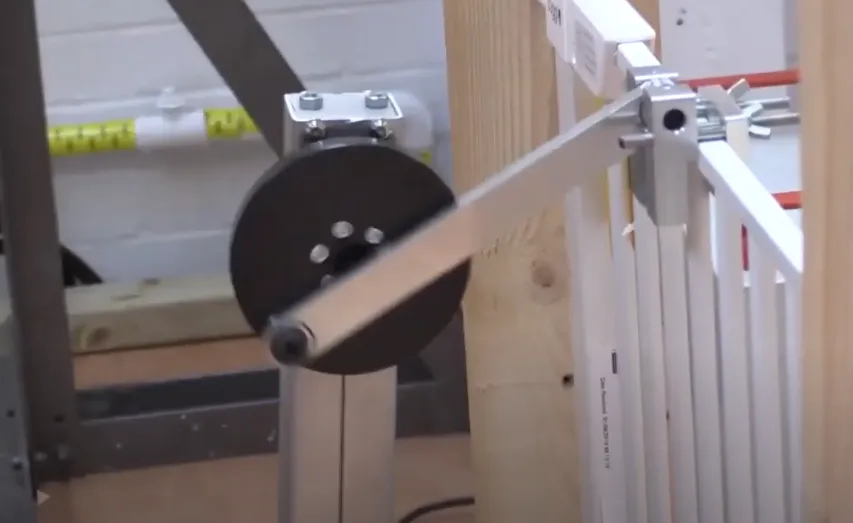ANSI HFES 100 Ergonomics Testing for Children’s Furniture and Desks
The ANSI/Human Factors and Ergonomics Society (HFES) Standard 100 provides a framework for the design of human factors in products to ensure that they are safe, usable, and comfortable. For children's furniture, this standard is particularly important as it helps manufacturers create ergonomic designs that cater specifically to children’s growing bodies.
The ANSI HFES 100 standards apply to a wide range of furniture items used by children including chairs, beds, desks, and seating in educational environments. Compliance with these standards ensures that the products meet specific ergonomic criteria designed to prevent injury and promote comfort during use. This service is critical for manufacturers aiming to comply with regulatory requirements or those seeking to enhance product safety and user experience.
Our laboratory adheres strictly to ANSI HFES 100 guidelines, ensuring precise testing methodologies and accurate evaluations of children’s furniture products. The testing process involves multiple phases including initial assessment, specimen preparation, performance evaluation, and final reporting. Here's a detailed breakdown of the steps involved:
- Initial Assessment: Our team conducts an in-depth review of product specifications to ensure they align with ANSI HFES 100 criteria.
- Specimen Preparation: Products are carefully prepared for testing, which may include adjustments or modifications as per the standard's requirements.
- Performance Evaluation: This phase involves rigorous testing using specialized equipment to measure various ergonomic parameters such as seat depth, back support angle, armrest height, and more.
- Final Reporting: Results are compiled into detailed reports that provide comprehensive insights into the product's ergonomic compliance.
The ANSI HFES 100 standard is particularly important for manufacturers of children’s furniture as it ensures that products are not only safe but also comfortable and supportive. This is crucial given the unique physical development stages of children, which require specific design considerations. By adhering to these standards, manufacturers can enhance product safety while meeting regulatory requirements.
Our laboratory offers a range of services beyond standard compliance testing. We provide detailed recommendations for improvement where necessary, helping manufacturers refine their products further. Additionally, our team is well-versed in international standards such as ISO 9241-7 and EN 50863-2, which complement the ANSI HFES 100 guidelines.
By choosing our laboratory for ANSI HFES 100 testing, you can ensure that your products meet the highest ergonomic standards. This not only enhances product safety but also contributes to a positive user experience, fostering trust and satisfaction among customers. Our commitment to quality and precision ensures that every test is conducted with utmost accuracy, providing reliable data for decision-making.
Industry Applications
The ANSI HFES 100 standard finds extensive application across various sectors where children's furniture plays a crucial role:
- Education Sector: Schools and educational institutions use ergonomic chairs, desks, and seating that comply with ANSI HFES 100 to promote student comfort and reduce the risk of musculoskeletal injuries.
- Childcare Facilities: Daycares and nurseries require furniture that is both safe and comfortable for young children. Compliance with ANSI HFES 100 ensures that these environments are optimized for child development.
- Sports Equipment Manufacturers: Companies involved in the production of sports equipment, including benches and seating for playing fields, also benefit from ANSI HFES 100 testing to ensure user comfort during prolonged periods of physical activity.
The standard is particularly vital for any product that involves young users, as it ensures that products are designed with their specific physiological needs in mind. By adhering to these standards, manufacturers can create furniture that not only meets regulatory requirements but also enhances the overall user experience.
Our laboratory's expertise in ANSI HFES 100 testing is particularly beneficial for companies looking to expand into new markets or improve product design based on rigorous ergonomic evaluations. Our team of experts ensures that every test is conducted with precision, providing reliable data that can be used to enhance product performance and user satisfaction.
Eurolab Advantages
Our laboratory offers several advantages for manufacturers looking to comply with ANSI HFES 100 standards:
- Comprehensive Testing Capabilities: Our state-of-the-art facilities are equipped with the latest testing equipment, enabling us to conduct thorough evaluations of products.
- Expertise in International Standards: In addition to ANSI HFES 100, our team is well-versed in other international standards such as ISO and EN, ensuring compliance across multiple markets.
- Detailed Reporting: Our reports provide comprehensive insights into product performance, highlighting areas for improvement and offering recommendations based on test results.
- Customized Solutions: We offer tailored testing services to meet the specific needs of our clients, whether they are looking to enhance product design or comply with regulatory requirements.
Beyond mere compliance, our laboratory provides valuable insights that can be used to improve product quality and user experience. Our team's expertise in ergonomic testing ensures that every test is conducted with precision, providing reliable data for decision-making. By partnering with us, manufacturers can enhance their products' safety and usability, thereby gaining a competitive edge in the market.
Environmental and Sustainability Contributions
In addition to ensuring product compliance and quality, our laboratory also contributes positively to environmental sustainability:
- Eco-Friendly Materials: Our testing protocols are designed to evaluate products made from sustainable materials, promoting the use of eco-friendly options.
- Energy Efficiency: By focusing on ergonomic design that reduces physical strain, our tests contribute to a more energy-efficient user experience. This is particularly important in educational and childcare settings where prolonged periods of sitting can lead to increased energy consumption.
Our commitment to sustainability extends beyond the testing process itself. We work closely with manufacturers to ensure that their products are not only compliant with regulatory standards but also contribute positively to environmental conservation efforts. By promoting sustainable practices, we help create a healthier and more environmentally conscious society.
The ANSI HFES 100 standard plays a crucial role in ensuring that children's furniture is safe, comfortable, and supportive. By adhering to this standard and leveraging the expertise of our laboratory, manufacturers can enhance product safety while contributing positively to environmental sustainability.





